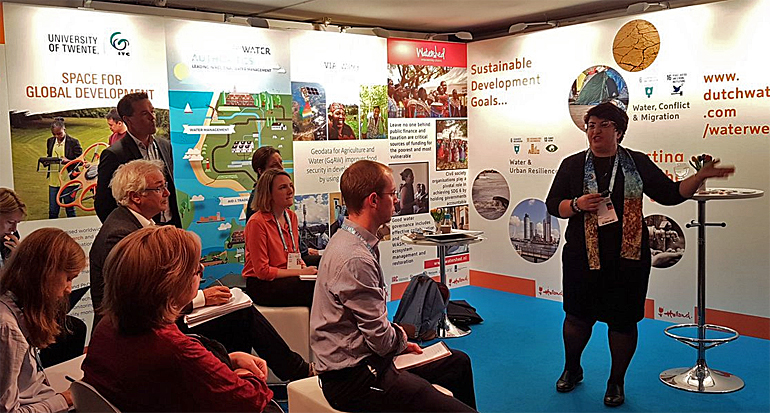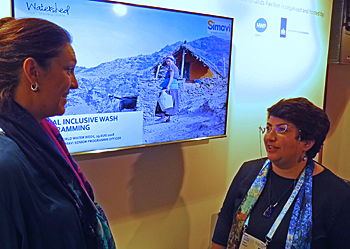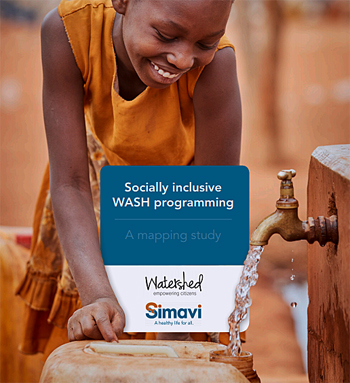SWWW 2018: Leave no one behind in WASH programmes demands a new mind-set
 Dutch aid organisation Simavi presented the first results of a study on social inclusion in WASH programmes. The study reveals that in many areas in the world different minority or vulnerable groups are not yet included in WASH-projects.
Dutch aid organisation Simavi presented the first results of a study on social inclusion in WASH programmes. The study reveals that in many areas in the world different minority or vulnerable groups are not yet included in WASH-projects.
Development organisations should have a more distinct approach towards inclusion of minority groups and vulnerable people when realizing water supply and sanitation projects, the study advises.
The study was presented by Simavi at the Netherlands Pavilion at the Stockholm World Water Week on 30 Augustus.
 Sara Ahrari of Simavi (right) called for tools fo get to a complementary approach for future WASH proiects.
Sara Ahrari of Simavi (right) called for tools fo get to a complementary approach for future WASH proiects.
Inclusion of vulnerable groups
This year’s Stockholm World Water Week focussed on nature based solutions and ecosystem services, but some sessions and presentations already preluded on next year’s theme, being ‘Leave no one behind’.
Anticipating on the future theme, Simavi published a study on the available strategies for social inclusion in WASH programmes.
‘The study is not finished yet’, said Sara Ahari of Simavi at the presentation. ‘It is a working document and we all invite you to add your insides and experiences’.
More awareness
‘If you build a water kiosk, be aware that for disabled and elderly it will be difficult to go there. The same goes for women to reach a water well deep down in a valley’, Ahrari added. She considered it already a big step forward if development organisations would start to recognise this ‘default’ in their projects.
‘It takes time and money to be inclusive for vulnerable groups’, Ahrari raised. ‘Time and money is not always available, but more awareness can be a first step to change the prevailing mind set.’
 The cover of the report that was presented in Stockholm.
The cover of the report that was presented in Stockholm.
New roadmap
The study mapped and assessed the distinct approaches, methods and tools used for social inclusion in WASH initiatives by a selected number of development organisations, some of which have a strong track record in this area.
According to Ahrari the study shows in practise it is difficult to be fully inclusive. ‘We need new tools to be able to develop an complementary approach, and formulate a road map’.
Persistent gaps
The study revealed unequal progress and persistent gaps, for example slower progress in accessing improved sanitation for female headed households in Bhutan and slower rates of progress for households with people with disabilities in Zambia in terms of the proportion of households in which everyone is able to conveniently and easily use the toilet.
In Tanzania, slippage has been a challenge, with initial impressive rates of progress declining due to the basic nature of toilets that poor households built after demand creation and their inability to withstand multiple rainy seasons.
Organisations involved in the preparation of the study are: World Bank, WaterAid, GIZ, Sida, Unicef, WSSCC and Brac; Dutch organisations Simavi, IRC, Wetlands International, Plan Nederland and VEI.
Download the executive summary or full study: Socially inclusive WASH programming.
Read also on this website
● Stockholm World Water Week 2018: A look back on an inspiring event to get SDG6 on track, 7 September 2018
● SWWW 2018: Blue deal seeks wisdom on water management from both sides, 6 September 2018
● SWWW 2018: Latest generation water-related apps for small farmers shown at African Spatial Delight, 4 September 2018
● SWWW 2018: Potential of blending finance remains untapped for water infrastructure in developing countries, 31 August 2018
● SWWW 2018: Water.org joins Finish Mondial to team up for affordable toilets worldwide, 31 August 2018
● SWWW 2018: Delft biotech pioneer Mark van Loosdrecht receives Stockholm Water Prize, 30 August 2018
● SWWW 2018: Open data on water availability can prevent that water scarcity leads to conflicts, 29 August 2018
● SWWW 2018: ‘Forge strong partnerships to scale up action’, 28 August 2018
● Meet the Dutch water delegation in the Netherlands pavilion at Stockholm World Water Week (booth 1 )
● IRC Wash receives Osprey grant for collective action towards universal WASH access, 6 April 2018
● Universal access to water: ‘How do we make sure no one is left behind?’, 4 May 2018
More information
Stockholm World Water Week
wwws.worldwaterweek.org
Simavi
Amsterdam, the Netherlands
+31 88 313 15 00
www.simavi.nl



